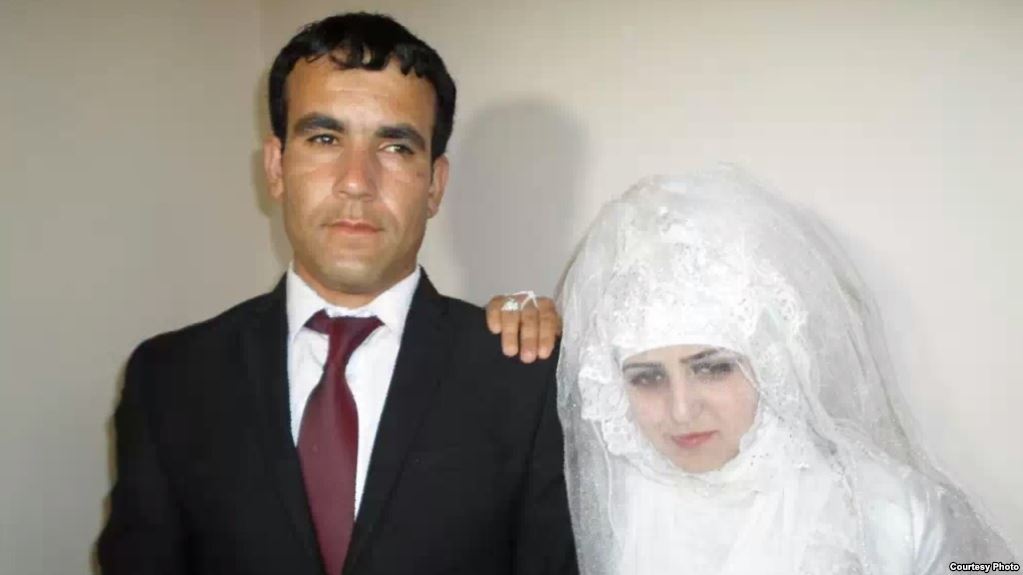Rajabbi Khurshed had no say in most of the misfortunes that befell her.
Her parents arranged the 18-year-old woman’s marriage, in her native village of Chorbogh in May, to a man she’d never met. The Tajik state obliged Khurshed to undergo a prenuptial medical exam, which in her case included a virginity test that while technically optional is routinely demanded of young women by either or both families. And her new husband, 24-year-old Zafar Pirov, cast her out weeks later after humiliating her with further virginity tests and demanding that he be allowed to take a second wife.
In the end, a despondent Khurshed seized the only control she felt was left.
Forty days after her wedding, the young woman, who had dropped out of school to help her parents look after two disabled brothers, drank what Tajik authorities say was a fatal dose of vinegar. She died at a local hospital in Chorbogh, in the southern Vose district, hours later.
Her family said Khurshed told them on her deathbed that she had been under enormous pressure from her husband since their wedding night and “couldn’t take it any longer.”
Her mother, Fazila Mirzoeva, said Khurshed had never had a boyfriend or an intimate relationship with anyone. She was a virgin and had a doctor’s certificate to prove it. Mirzoeva called her daughter a victim of “slander and violence,” and said the family has directed public pleas to President Emomali Rahmon and other officials to intervene to help preserve Khurshed’s reputation.
Pirov, meanwhile, faces charges of driving his new wife to suicide and could face up to eight years in prison.
Speaking to RFE/RL’s Tajik Service from his parents’ home in Chorbogh, he defended himself by insisting that his new wife was not a virgin on their wedding night, no matter what her documents said.
“She drank vinegar when I demanded that she go back to her parents’ home,” Pirov said.
Mandatory Medical Check-Ups
Premarital sex is taboo in conservative Tajik society and can lead to a lifetime of public scorn for women.
Mandatory medical check-ups for both bride and groom were instituted in 2015 primarily to prevent the spread of HIV/AIDS, hepatitis, and other sexually transmitted diseases, but they are frequently expanded to include virginity tests for women. Registrars can refuse to recognize a marriage if the couple fails to undergo the tests and provide the proper medical certificate.
Khurshed had opted to undergo a so-called “purity” test and received a doctor’s letter confirming the result.
But in the poorest of Central Asia’s five post-Soviet republics, where wages are low and corruption is widespread, many Tajiks believe that doctors’ certificates can be bought with a bribe.
Pirov said he took his new wife to two different clinics, including one in the capital, Dushanbe, to undergo further tests to prove her purity. Both confirmed Khurshed’s virginity, but Pirov was adamant that the doctors were wrong and said he continued to demand that his bride “tell the truth.”
Eventually, just weeks into their marriage, he pressed his bride to let him bring a second wife into the household. “My wife gave me a written statement that she allows me to get a second wife because she wasn’t a virgin when we got married,” Pirov told RFE/RL.
Hundreds Of Virginity Disputes
A Vose district court has imposed a travel ban on Pirov pending the trial, though no date has been set.
Virginity disputes have torn families apart in Tajikistan.
Courts recorded about 600 cases citing virginity disputes in 2014, before the prenuptial medical tests were introduced. Most involved women suing their husbands for wrongly declaring them “impure” on their wedding night.
In 2014, a 19-year-old bride from the Dushanbe’s Rudaki district successfully sued her new husband for slander after he beat her and sent her back to her parents’ home on their wedding night, accusing her of not being a virgin.
The bride, identified by her first name, Husnigul, underwent several court-appointed medical tests that concluded her virginity was maintained even after her wedding night. The court declared Husnigul a virgin and ordered the bridegroom to pay her financial compensation. Husnigul said she filed for divorce, declining her husband’s offer to put the dispute behind them and begin married life together.
The head of the National Forensics Center in Dushanbe, Yahyo Odinaev, speculated that in some cases men “fail to perform out of their own inexperience or other psychological factors” but place the blame on their brides.



